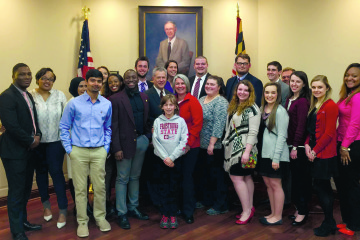Students Relocated Due to Continued Cambridge Hall Issues
Over 150 students who lived in Cambridge Hall have been displaced to other residence halls due to the return of mold, which affected the hall earlier this year. In August, the first round of mold treatment finished, just in time for the start of the semester. However, this mold has returned, which has led the residents of Cambridge to be moved to other living spaces on campus.
University President Ronald Nowaczyk met with students on Wednesday and Thursday to address their concerns. In a follow-up email sent to all FSU students, Nowaczyk said, “following the mold abatement in August and even more rain, we noticed additional moisture issues, including those we think are related to the mechanical upgrades [to the hall]. Rather than wait when we were still exploring the most effective ways to address the problem, we decided the best decision would be to close Cambridge and move students before we got too far into the semester and the weather got colder.”
President Nowaczyk also noted that many other universities within the state of Maryland were experiencing similar issues. Other buildings on campus were having issues due to moisture issues as well. The basement of the Guild building has been extremely susceptible to moisture issues, which prompted most of the faculty offices of the Departments of Sociology and Social Work to be moved.
During a meeting on Friday, President Nowaczyk, flanked by Vice President for Administration and Finance Leon Wyden and Assistant Vice President for Student Affairs Jeff Graham, addressed students who were concerned and frustrated about the closure of Cambridge Hall. Many of the students who lived in single-occupancy dorms have been relocated to dual-occupancy dorms, where they now have new roommates. As Graham put it, “listening to these stories is part of the process of improvement.”
It is uncertain how long Cambridge hall will be closed. Cambridge now joins Annapolis hall in being closed. Annapolis hall is currently undergoing renovations and is expected to reopen in Jan. 2019. The renovations happening to Annapolis are expected to happen in other halls as well, though the mold issue in Cambridge has put a damper on the excitement. Many of the halls were constructed in the 70s, and as a result they are out of date. Few residence halls have air conditioning. “We haven’t been putting enough money into our structure,” President Nowaczyk said on Friday.
The University’s decision to close Cambridge was partially motivated by the weather; relocating students later in the semester, and closer to winter, would only compound the logistics of moving over 150 students. At the meeting on Friday, some students expressed their concerns that there may be mold issues in other buildings, seeing as two buildings have already been affected by moisture issues. According to President Nowaczyk, a cold winter might deter any potential mold growth. “We are trying our best to minimize the disruption to students as much as possible, while keeping the facilities safe for everyone,” President Nowaczyk noted.



